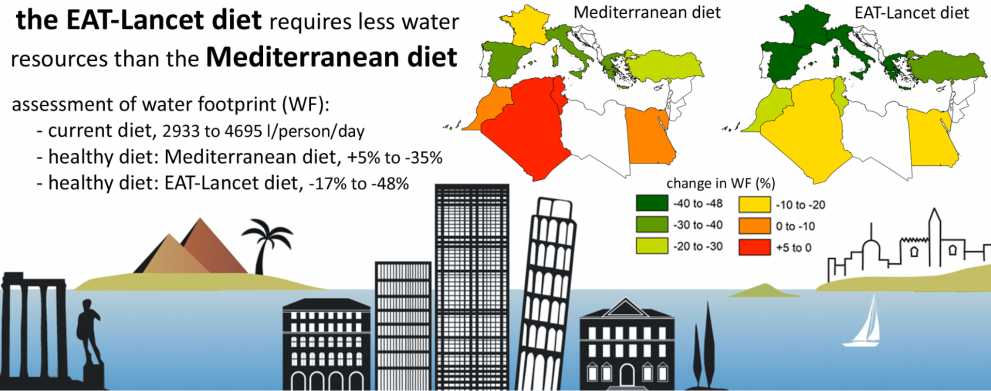
A new paper published in the journal Resources, Conservation & Recycling shows that people in Mediterranean countries can reduce their water footprint by shifting to a healthy Mediterranean or EAT-Lancet diet.
Such a shift could help make sustainable use of the increasingly scarce water resources in Mediterranean countries, where the food system is the largest driver of
water use.
The Mediterranean and EAT-Lancet diets
The Mediterranean and EAT-Lancet diets are both healthy and environmentally sustainable. Both include high intakes of vegetables, fruit, pulses and nuts and low intakes of animal products such as meat.
The EAT-Lancet diet is scientifically optimised for both nutrition and certain environmental indicators. It is rich in fruits and vegetables, with protein and fats sourced mainly from plant-based foods and unsaturated oils from fish, and carbohydrates from whole grains. It had a big impact in the scientific literature and mainstream media when it was published in 2019.
The Mediterranean Diet is entrenched in the history of the Mediterranean Sea and its region. The traditional Mediterranean diet is based on whole cereals, legumes, vegetables, fruits, nuts and olive oil, with lesser consumption of dairy, meat and poultry.
Better diets can help reduce water footprint of food consumption
In their paper, JRC and University of Barcelona scientists analysed to what extent the water footprint of people in nine countries - representing 88% of the population of all countries bordering the Mediterranean - would be affected by shifting to these two healthy and environmentally sustainable dietary patterns.
They show that shifting to the EAT-Lancet diet would reduce the existing water footprint of food consumption by 17% to 48% in all Mediterranean countries.
The Mediterranean diet reduces the water footprint of Spain, France, Italy, Greece, Turkey, Egypt and Morocco by 4% to 35%.
For the Maghreb countries Tunisia and Algeria, shifting to the Mediterranean diet slightly increases the water footprint of food consumption, especially due to the high olive oil intake recommendations in this diet.
The authors also find that increasing the water productivity of olive oil and fruits (also referred to as producing more crop per drop) would further reduce the dietary water footprint in the Maghreb countries Morocco, Tunisia and Algeria.

The researchers also prove for the first time that the EAT-Lancet diet requires less water resources than the Mediterranean diet.
Informing policy and the SDGs
The researchers indicate that shifting to these two healthy diets and increasing water productivity can help achieve SDG Target 6.4, which aims at reducing global water scarcity. This is particularly important for an increasingly water scarce Mediterranean region.
Integrated food system policies can find valuable information in this analysis, by identifying trade-offs and win-win options with other environmental, economic and sociocultural indicators.
Further information
- Which diet has the lower water footprint in Mediterranean countries?
- Guiding Principles for Sustainable Healthy Diets
- Territorial and Sustainable Healthy Diets
- Water Resources for Sustainable Healthy Diets: State of the Art and Outlook
- Farm to Fork Strategy
- Food in the Anthropocene: the EAT–Lancet Commission on healthy diets from sustainable food systems
Related Content
Which diet has the lower water footprint in Mediterranean countries?
Guiding Principles for Sustainable Healthy Diets
Territorial and Sustainable Healthy Diets
Water Resources for Sustainable Healthy Diets: State of the Art and Outlook
Food in the Anthropocene: the EAT–Lancet Commission on healthy diets from sustainable food systems
Details
- Publication date
- 11 May 2021
